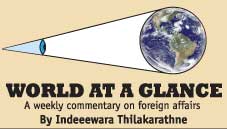
Europe’s great divorce
In an effort to stabilise the euro zone, France, Germany and 21 other
countries have decided to draft their own treaty to impose more central
control over national budgets. Britain and three others have decided to
stay out. In the coming weeks, Britain may find itself even more
isolated. Sweden, the Czech Republic and Hungary want time to consult
their parliaments and political parties before deciding on whether to
join the new union-within-the-union.
So two decades to the day after the Maastricht Treaty was concluded,
launching the process towards the single European currency, the EU's
tectonic plates have slipped momentously along same the fault line that
has always divided it—the English Channel.
Confronted by the financial crisis, the euro zone is having to
integrate more deeply, with a consequent loss of national sovereignty to
the EU (or some other central co-ordinating body); Britain, which had
secured a formal opt-out from the euro, has decided to let them go their
way.
Whether the agreement does anything to stabilise the euro is moot.
The agreement is heavily tilted towards budget discipline and austerity.
It does little to generate money in the short term to arrest the run on
sovereigns, nor does it provide a longer-term perspective of
jointly-issued bonds. Much will depend on how the European Central Bank
responds in the coming days and weeks.
Some doubt remains over whether and how the "euro-plus" zone will
have access to EU institutions—such as the European Commission, which
conducts economic assessments and recommends action, and the European
Court of Justice, which Germany hopes will ensure countries adopt proper
balanced-budget rules—over Britain's objections.
But especially for France, on the brink of losing its AAA credit
rating and now the junior partner to Germany, this is a famous political
victory. President Nicolas Sarkozy had long favoured the creation of a
smaller, "core" euro zone, without the awkward British, Scandinavians
and eastern Europeans that generally pursue more liberal,
market-oriented policies. And he has wanted the core run on an
inter-governmental basis, ie by leaders rather than by supranational
European institutions. This would allow France, and Sarkozy in
particular, to maximise its impact.
With the entry next year of Croatia, which will sign its accession
treaty today, the EU is still growing, said Sarkozy. “The bigger Europe
is, the less integrated it can be. That is an obvious truth.”
Indian hospital fire in Calcutta kills dozens
At least 89 people have been killed in a fire that broke out in a
hospital in the eastern Indian city of Calcutta (Kolkata), officials
say.
Most of the victims were patients who were trapped after the flames
spread through the AMRI hospital.
The fire started in the multi-storey hospital's basement, where
flammable materials were stored. Firefighters took five hours to control
the blaze.
Six board members of the hospital have been arrested.
They include hospital co-founders SK Todi and RS Goenka. West Bengal
Chief Minister Mamata Banerjee said the licence of the six-storey
hospital in Dhakuria in the southern part of the city had been
cancelled.
She said the fire was an "unforgivable crime" and that those
responsible would be given the harshest punishment.
A Upadhay, a senior vice-president of the AMRI hospital company, told
Associated Press there were 160 patients in the 190-bed hospital.
A spokesman for Manmohan Singh said the prime minister had "expressed
shock and anguish over the loss of lives".
Barack Obama offers America a new square deal
Every time a president seeks re-election, it is something of a
parlour game in Washington, DC, to ask which of his predecessors’
campaigns he will take as a template. Will Barack Obama attempt to
persuade voters, as Ronald Reagan did in 1984, that the darkness of
recession was giving way to “morning in America”? The enduring
listlessness of the economy makes that a tricky sell. Could he perhaps
emulate Harry Truman’s successful tirade of 1948 against the “do-nothing
Congress”? Mr Obama is better at warming cockles than thumping tubs, and
in any case control of Congress is divided, making Democrats as
responsible for its ineffectiveness as Republicans are. This week Mr
Obama put an end to the debate by publicly invoking a different role
model: Teddy Roosevelt.
On December 6th Mr Obama travelled to Osawatomie, a small town in
Kansas where Roosevelt gave a celebrated speech in 1910, laying out the
platform that he would eventually adopt as a third-party candidate for
president two years later. Before a crowd of 30,000 he elaborated on his
longstanding theme of a “square deal” for working Americans—a concept
that had made him wildly popular during his nearly two terms in office.
America’s economy and political system were biased towards the rich, the
former president complained; he promised to give the little guy a fair
shake.
|

